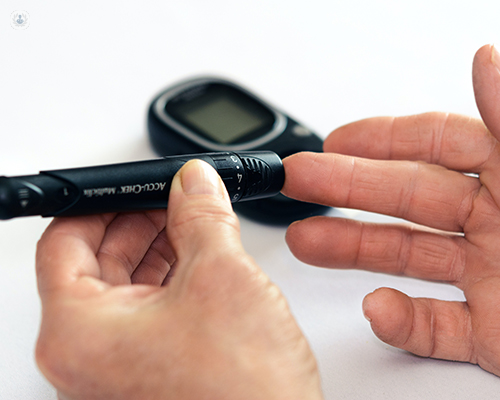The benefits of metabolic surgery
Escrito por:Metabolic surgery can greatly improve the general health and quality of life of those living with diabetes. In his latest article, highly renowned general, upper GI and bariatric surgeon Mr Sasindran Ramar explains the great benefits patients can enjoy if they opt for metabolic surgery.

What is metabolic surgery and how does it differ from bariatric surgery?
Metabolic surgery is very similar to bariatric surgery. The difference is that metabolic surgery is done to improve the outcomes and health of people living with diabetes. Some of the same procedures are done and considered to be both bariatric and metabolic surgery, for example, gastric band or gastric bypass. These procedures are routinely performed on obese patients to lower their BMI.
Usually, people with a BMI over 40 consider these procedures. However, people who are suffering from diabetes and have a BMI of over 32.5 can also consider them. This is when it is known as metabolic surgery.
Some may wonder why the distinction between bariatric and metabolic surgery is made. It is important to make this distinction as these procedures can greatly improve both the longevity and quality of life of diabetic patients.
How is metabolic surgery performed?
This depends on the procedure being performed. The two procedures I most often perform are sleeve gastrectomy and gastric bypass. The gastric band used to be very popular but we have since found that the sleeve gastrectomy gives better results.
Both procedures yield very positive results. They have great results in terms of glucose control; in 80% of patients, the diabetes is in remission within a year, and after 5 years 40% of patients are still in remission.
Of course, some patients respond to the surgery better, such as those who have had diabetes for a shorter period and don’t take insulin. However, if you have had diabetes for a longer period and you are on insulin, remission is less likely. Nevertheless, your insulin dosage will decrease when you lose weight thanks to the surgery, which is always a positive outcome.

Can metabolic surgery cure diabetes?
Diabetes is a progressive disease with lots of treatments, but once you get it, more than 95% of people will have an increasing amount of medication, they need to take over time. Some will have to take insulin.
However, when one of these procedures is done on a diabetic patient, their glucose level immediately drops following surgery, reducing the amount of medication they need to take. 80% of patients will be in remission in the year following the surgery. However, it sometimes comes back. Approximately 40% of patients still show no signs of diabetes five years after the surgery.
We can increase the remission rate by performing certain other procedures or variations of bypasses, but this comes with other possible complications. If you want to benefit from these risks and benefits, I believe a gastric bypass is a gold standard procedure.
Are all patients with diabetes suitable for metabolic surgery?
There are certain criteria a patient must meet before we decide to do metabolic surgery. This has been agreed upon by multiple different international diabetic associations. The first one is being diabetic with a BMI of over 35. If your diabetes is not responding to medication, then these procedures may be considered with a BMI of just 32.5.
The BMI cut-off can be even lower in certain ethnic groups, such as Asians, as they have a higher rate of metabolic syndrome, one of the complications of diabetes. This is more common among people from India, for example.

What is involved in recovery from metabolic surgery and how do patients manage their diabetes following the surgery?
The recovery is very straightforward. Most of my patients stay in the hospital for one night after a bypass or a sleeve. The surgery technique has evolved so much that some centres are doing day-case metabolic surgery, but I prefer to keep my patients for one night.
Patient education is key when managing diabetes post-surgery. Most of my patients have a very good understanding of diabetes, and know what medication they need to take, and when to take it. My team and I liaise with the patient’s GP or a different specialist they are seeing such as a diabetes specialist or endocrinologist, to measure how much insulin the patient requires the day after surgery. We monitor the patient over the first week to ensure that they are receiving the correct amount, as it may change in the days following the surgery.
If the patient is just taking tablets, then it is pretty easy. We stop all of the tablets, except metformin, which they usually take twice a day, and then monitor their blood pressure to see what changes are needed (or not) to their medication. Again, their GP or another specialist will help monitor this to ensure they are receiving the correct treatment following the surgery.
Mr Sasindran Ramar is a leading general, upper GI and bariatric surgeon based in London and Beckenham. With over 30 years of experience, Mr Ramar is an expert in a wide range of surgical procedures. If you would like to book a consultation with Mr Ramar, you can do so right now via his Top Doctors profile.


